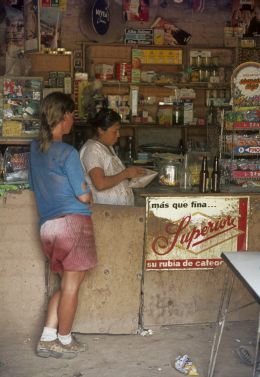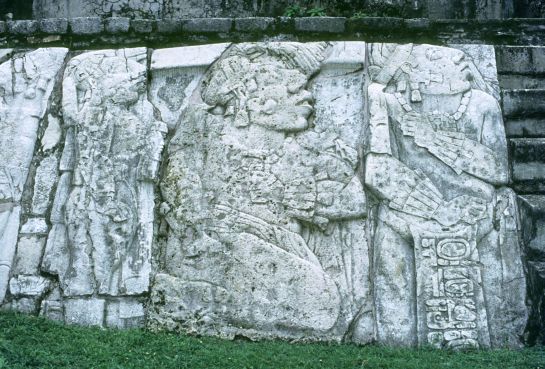| Barelds - Cycling around the world - Cycle stories - Asia, Africa, Europe, America | ||||||||||||||||||||
| home | site map | world | children | recent | cooking | dutch | german | react | ||||||||||||
Central and North America (2).
U
tterly miserable I sat in the front of the canoe, wet to the skin of the salty sea, which in great waves washed over us. I (sea sick) wanted to lean outboard but behind me I heard Henny shouting "spit in front of you", afraid that I would drop the camera bags, wrapped in plastic on my lap, into the sea. He himself sat in the rear part of the long hollowed tree trunk and tried, with an oar, to pull the plastic better over the bicycles.

Shopping during our cycling tour in Latin America, small orderly and nice contacts.
The whole night and day we had sailed on a small fishing boat, from Turbo, where the road ended, to cross the Gulf of Urabá. Now we had changed into this tree trunk to sail around the cape of Tiburon, which was the border between Colombia and Panama. The sea was extremely turbulent: one moment it lifted us up sky high, we overlooked everything saw the uninhabited jungle cost, the next moment we only looked against a wall of water, which fell down on us with tremendous force.
After one hour we stood happily on the dry beach of Puerto Obaldía lined with palm trees. Our boatswain, a large negro, accompanied us to the immigration. We had already paid why than, we observed some uneasiness. The civil servant, an arrogant white, examined our passports. "No visa" he boomed "go back to Columbia again". After such a sea journey, this didn't appeal to us at all.
"But señor" Henny persevered "the consulate in Medellín assured us, that we could get the visa at the border". That was not true, but a Swiss had told us that, and he entered Panama from the North.
It was not our habit to appear at a border without the necessary documents, we always had that in good order. In Ecuador we already had been to the Panamese embassy for a visa.
There they simply said," "No, you must have an outward voyage ticket".
"But we are travelling by bike."
"Than you must have a visa for Costa Rica"
"But being a Dutchman we don't need a visa" we said.
"Than another Central American state".
"For these states we don't need anything".
Then the man became angry and didn't want to help us anymore.

Mexico: Maya reliefs in Palenque; one of the many Maya ruins in the Yucatán.
We will try in Colombia, we comforted each other. The consulate in Medellín had a different excuse: "only when you leave the country via Cartagena". That was a 1000 km detour for us. Therefore, with so much unwillingness we had taken the risk.
And there we were, wet and salty. There were more stranded people, not because they had no visa, but because they had too little money in their pockets to be allowed to enter the country. This gave Henny an idea. "We have enough money with us" and he brought out his cheques. And look, money changed the matter, now the passports could be taken in the aircraft, the only connection from Puerto Obaldía to the capital, to obtain the necessary visum.
The days we had to wait, were spent on disassembling our bicycles which were grievously affected by the salt. A sad operation, during this great overhaul a lot of totally worn out parts emerged and replacing them was impossible: in this hamlet you could only get coconuts and plantains. Henny already began to vomit when eating plantain mash, or baked or cooked plantains when the aircraft got back with the passports. But it was carnival.
"I have a day off" the immigration officer said, and that you could see. His head was covered with spaghetti and the tomato sauce ran all over his face. The bicycles lay dissembled on the landing strip, but anyhow we could not go with the aircraft, because they were small 4-person aircraft. Two days later another plane with a paunch, arrived. The pilot looked at the heap of parts and for some extra money everything would be transported. Now I had to go after the passport, and as a woman you get more things done from the Latinos. Deadly drunk he could only murmur: "a great favour, I have a day off" and he had just enough power to place the "IN"-stamp.
| Start World around | Central and North America | << Previous | Next page >> | |||
| Barelds on bicycle through the world - Cycling in Asia, Europe, Africa, America | ||||||